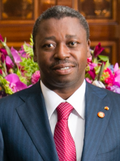| President of the Togolese Republic | |
|---|---|
| Président de la République togolaise | |
 Presidential Standard | |
since 3 May 2025 | |
| Type | |
| Residence | New Presidential Palace, Lomé |
| Appointer | National Assembly |
| Term length | Six years, non renewable |
| Constituting instrument | Constitution of Togo (2024) |
| Formation | 27 April 1960 |
| First holder | Sylvanus Olympio |
 |
|---|
This is a list of presidents of Togo since the formation of the post of president in 1960, to the present day.
Contents
- Description of the office
- Election
- Oath of office
- Vacancy
- Residences
- List of officeholders
- Timeline
- Latest election
- Notes
- See also
- References
- External links
A total of five people have served as president (not counting one acting president and two interim military officeholders). Additionally, one person, Faure Gnassingbé, has served on two non-consecutive occasions: first from the death of his father, Gnassingbé Eyadema, on 5 February 2005 until his resignation 20 days later on 25 February and the second one from 4 May 2005 until 3 May 2025.
Togo has, for most of its independence, had a presidential system in which the president was not only the head of state, but also the head of government and that the role had much power over both domestic and foreign policy. However, constitutional reforms adopted in April 2024 reduced the president's powers, made the role more ceremonial, and moved the country towards a more parliamentary system. While the role became ceremonial, the president is still the commander-in-chief of the Togolese Armed Forces and still has the power to appoint or dismiss the prime minister. The reform also changed the way the president is elected, from being directly elected by citizens to being indirectly elected by the National Assembly. [1] [2]






